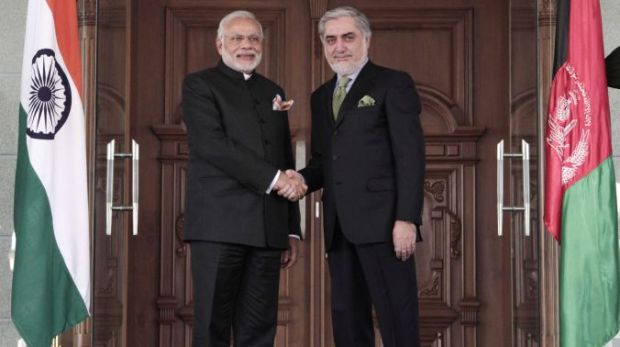Pakistan Frowns As Afghan CEO Visits India
Abdullah with PM Modi

NEW DELHI: In a major regional development having influential geo-political strategic output, Afghanistan CEO Abdullah Abdullah on Monday met Prime Minister Narendra Modi as the two countries inked an agreement on visa-free travel for diplomats. PM Modi also expressed his gratitude to Afghanistan’s bravery for protecting India’s consulate in Mazar-e-Sharif during the terror attacks on January 4-5, 2016. Meanwhile, Sushma Swaraj tweeted ‘Strategic partnership for the benefit of people. EAM @Sushma Swaraj conveys approval of 3rd phase of 92 small dev projects in Afghanistan to CEO.’
Last year, during his impromptu visit to Pakistan, Indian Prime Minister was actually returning from Afghanistan, after inaugurating the Parliament building, which has been constructed by India. Additionally, India has committed to investing $2 billion in the reconstruction of Afghanistan, along with providing it Mi-35 helicopters for the ongoing battle of Helmand.
The growing political intimacy between India and Afghanistan is definitely not wanted by Pakistan. Vanda Felbab-Brown states how “In the absence of dramatically improved relations with India, Pakistan is likely to prefer an unstable Afghanistan to a strong Afghanistan closely aligned with India.”
There are several ways in which the current relationship between Afghanistan and India can be read.
Firstly, India has become the largest regional donor for Afghanistan, helping in its reconstruction, soon after the overthrowing of Taliban. This aims at promoting regional stability, both through ‘hard’ and ‘soft’ power mechanisms, adopted by the Indian government.
Secondly, the strategic location of Afghanistan is important as it falls on the route for energy coming from Central Asia. Thus, it is more important for India to foster good ties as it looks forward to a more nuanced regional energy cooperation. It already includes a signed memorandum of understanding with Turkmenistan to develop a natural gas pipeline.
Thirdly and most importantly, India’s major infrastructural initiatives in Afghanistan also aim at construction of a highway which links Afghanistan’s ring road to Iranian ports on the Persian Gulf. This highway to dramatically reduce Afghanistan’s dependence on Pakistan, as it is a land-locked country, especially on the sea access.
According to the report by Congressional Research Service (CRS), Pakistan wants to deny any form of Indian strategic depth in Afghanistan. The Department of Defense reports reveal that Pakistan uses proxy forces in Afghanistan to counter Indian influence there. In fact, Pakistan has been stating the India has been using its nine consulates in Afghanistan to recruit anti-Pakistan insurgents.
Crucially, Pakistan’s willingness to accommodate Afghanistan-oriented militant groups is motivated by a fear of provoking militants to incite violence in Punjab and threaten the core of the Pakistani state instead of focusing externally. This paralyzing fear persists despite Pakistan’s desire to defeat Tehrik-i-Taliban Pakistan.
China’s increasing activity in Afghanistan might eventually motivate Beijing to put pressure on Pakistan in a way that it has previously been unwilling to do. Pakistan may thus face more united international pressure regarding its policies in Afghanistan and accommodation of militants than ever before.
Though, Hekmat Khalil Karzai, the deputy foreign minister of Afghanistan, stated in an interview to The Diplomat that Afghanistan wants to have friendly relations with both Pakistan and India, at the same time. He stated ‘I don’t think our relationship with Pakistan has any impact on our traditional friendship with India. As a sovereign state, we expect to be able to maintain the same types of relationships as other countries. For example, many states are friends with both China and the U.S.A. at the same time. Why shouldn’t we be allowed to have a strong relationship with both India and Pakistan?’
But after the serious debacle in Indo-Pak talks after the Pathankot terrorist attack, it seems impossible that Afghanistan would be able to redeem its friendly relations with both the countries and would have to choose one. As far as real-politik is concerned, befriending India would serve benefits for Afghanistan’s reconstruction which certainly Pakistan would not be able to do much in. Nevertheless, it’s with time when the impact and influence of Indo-Afghanistan relations would be able to foster with a concrete instance to their respective development.
(The writer is a doctoral student at JNU, New Delhi)



